1.2 billion ballots, 800,000 polling stations, 17,000 islands: The stunning logistics of Indonesia's election
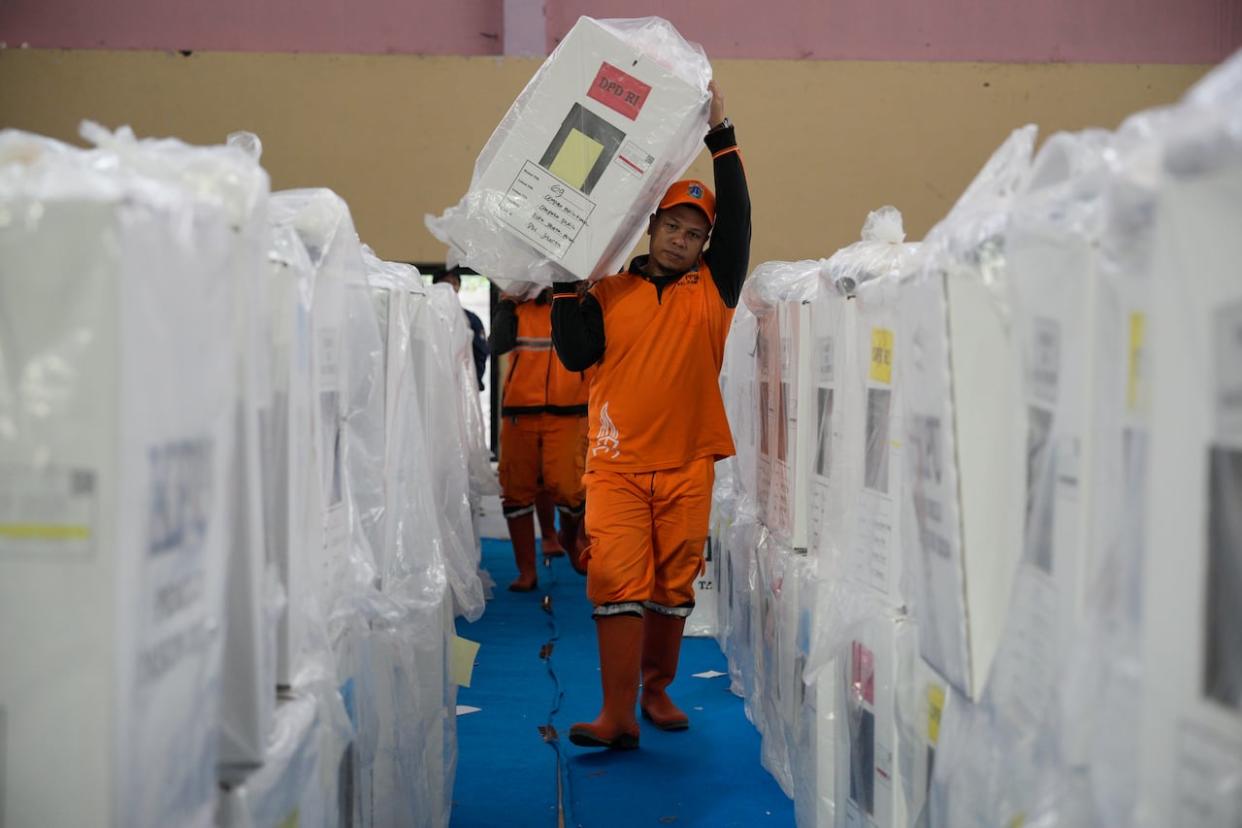
Over land, across seas, through the air and even being dragged by a cow — these are just some of the ways that ballot papers and boxes will reach polling stations in Indonesia's astonishing one-day election.
Nearly 205 million people are registered to vote on Wednesday, as the world's third-biggest democracy decides on a new president.
Serving these voters will be more than 800,000 polling stations, spread across this archipelago of some 17,000 islands.
It's a logistical challenge, which is made even more difficult by unpredictable events in the run-up to polling day.
"Some of the challenging aspects in managing election logistics include limited time, extreme weather, geographical conditions and even security disturbances," said Yulianto Sudrajat, head of the planning and logistics division at Indonesia's general elections commission.
Elections officials in central Java have already postponed voting in 10 villages due to floods, with more warnings of potential disruption in the west of the island on election day.
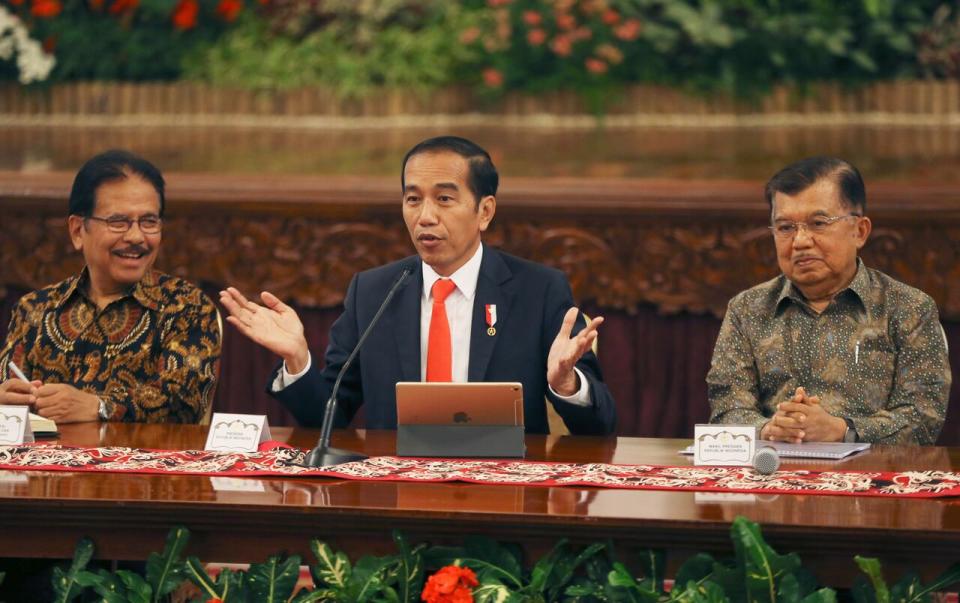
Indonesia President Joko Widodo, centre, speaks during a media conference at the palace in Jakarta, Indonesia, on Aug. 26, 2019. Widodo had announced to relocate the country's capital from overcrowded, sinking and polluted Jakarta to East Kalimantan province. (Achmad Ibrahim/The Associated Press)
Open presidential race
Voters are deciding on a replacement for outgoing President Joko Widodo, with Defence Minister Prabowo Subianto the current frontrunner.
Subianto is head of the populist Gerindra party. He has pledged to continue with many of the outgoing president's major policies and is running alongside Widodo's son, Gibran.
The candidate for the ruling Indonesian Democratic Party of Struggle is former Central Java governor Ganjar Pranowo. He has campaigned as a man of the people, but Widodo decided against backing him.
The third candidate is Anies Baswedan, who is running as an independent. Unlike Subianto and Pranowo, Baswedan has pledged to move away from Widodo's flagship policies, including the decision to move the country's capital away from Jakarta.
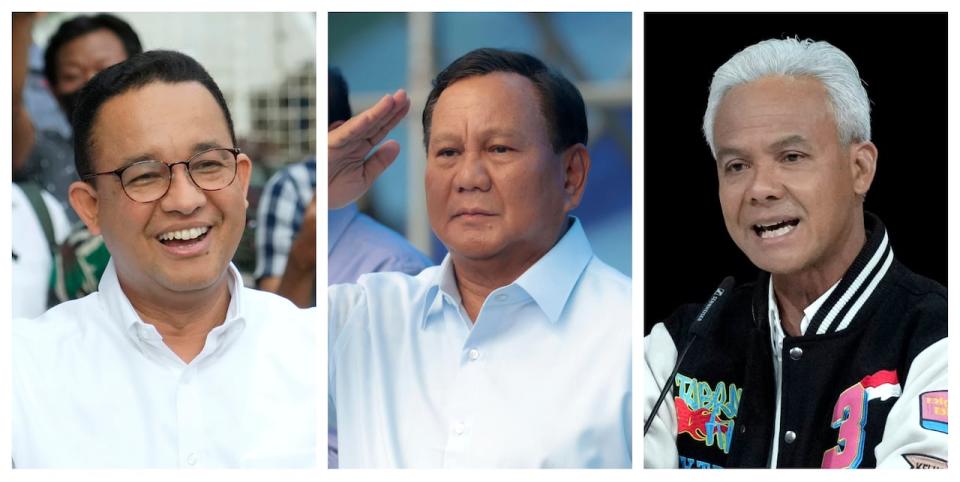
This composite photo shows Indonesian presidential candidates, from left, Anies Baswedan, Prabowo Subianto and Ganjar Pranowo. (The Associated Press)
Presidents are elected for a five-year term but can only rule a maximum of two terms.
Indonesians will also elect a new vice-president as well as parliamentary and local representatives.
Security officials will likely be on high alert on Wednesday, following unrest after the last presidential election in 2019.
Protesters took to the streets and clashed with police after official results showed that Widodo had secured a second term as president. Eight people were killed in the violence in Indonesia's capital.

A police officer assists an electoral worker to drive his motorbike up a hill as they distribute ballot boxes and other election paraphernalia to polling stations in remote villages ahead of Wednesday's election in Maros, Indonesia, Tuesday. (Masyudi S. Firmansyah/The Associated Press)
'Incredible' logistics
The election requires a staggering 1.2 billion ballot papers to be produced ahead of polling day.
"There are also various types of election logistics that are only produced every time there is an election, so there is often a scarcity of raw materials and availability of printing presses that are capable of such large-scale production," said Sudrajat.
Polling stations will be open for six hours on election day, with ballots cast from 7 a.m. until 1 p.m. local time. Indonesia spans roughly 5,100 kilometres from east to west, with the country operating on three different time zones.
"The logistical effort to pull off these elections is incredible," said Ben Bland, director of the Asia-Pacific program at Chatham House in London.
"It's a testament to how important democracy is to the Indonesian people."
Traditional voting methods
Once voters reach the polling station, they are required to select their preferred candidate by punching a hole into the ballot paper with a nail.
"That's the way it's been done for some time and officials worry that if they change the system, it might confuse voters," said Bland.
"It means that when election workers hold up ballot papers during the open count, witnesses can clearly see which candidate was chosen."

People carry ballot boxes to be distributed to polling stations ahead of Wednesday's election, in Kanekes village, Indonesia, on Tuesday. (Rangga Firmansyah/The Associated Press)
When a ballot has been cast, voters dip their finger into a pot of indelible ink. These traditional methods are used to ensure the legitimacy of the voting process.
"The ink is to stop voter fraud, ensuring people can only vote once. Punching a hole into the ballot is also a hard thing to fake — you can't cross it out, for instance," said Sharyn Davies, Director of the Herb Feith Indonesia Centre at Monash University in Melbourne.
Indonesia's diversity is also reflected in subtle voting changes that take place in the country's easternmost province of Papua.
In some of the more remote tribal communities, the "noken system" is used to cast ballots. This is a communal form of voting, with the head of a village representing the community at a polling station.
Some have called for the removal of this system, given concerns over transparency and fairness.
Relatively young democracy
Wednesday's vote is just the fifth time that Indonesia has directly elected a president, following democratic reforms in 1998 after the downfall of former president Suharto.
This relatively young democracy also has a youthful electorate.
Over half of registered voters are under the age of 40, with candidates taking to popular social media sites like TikTok in a bid to target this young demographic.
Fatyah Adzikra, 34, works for a start-up in Jakarta and said she will be voting in the Indonesian capital on Wednesday.
"I am quite excited to vote. The election is an opportunity to raise your voice as a citizen and I believe that one voice does matter," said Fatyah.
"Honestly, I am never 100 per cent confident about the fairness of the election, but currently many citizens are becoming more aware about politics and they are watching this election closely," she added.
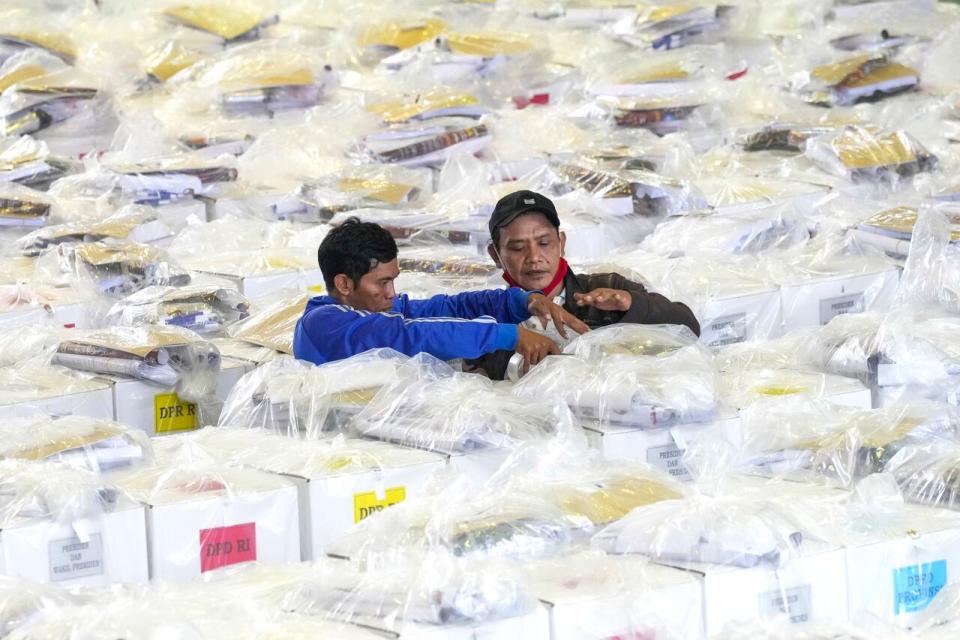
Workers prepare ballot boxes to be distributed to polling stations ahead of Wednesday's election in Jakarta, Indonesia, on Tuesday. (Tatan Syuflana/The Associated Press)
Election worker health concerns
More than five million election officials will be tasked with ensuring the fairness of the vote on polling day, although these workers will have to also keep their own health in check.
Indonesian media reported that 894 election workers died during the 2019 vote, largely due to the heavy workload and long hours required to ensure that all ballots are counted.
To avoid a repeat of that tragedy, the country's elections body has implemented stricter checks on the health of workers.
"We have tightened the selection process of ad-hoc election officers, so that there will be no recurrence of the death of election officers in carrying out their duties," Sudrajat said.
Quick vote, long count
Indonesia sits behind the United States and India in terms of the size of its democracy. With all three countries holding elections this year, they contribute to 2024 being the biggest election year in history.
But Southeast Asia's biggest country is the only one to opt for a one-day vote. Early polling is offered in the U.S., while India's elections stretch out for weeks.
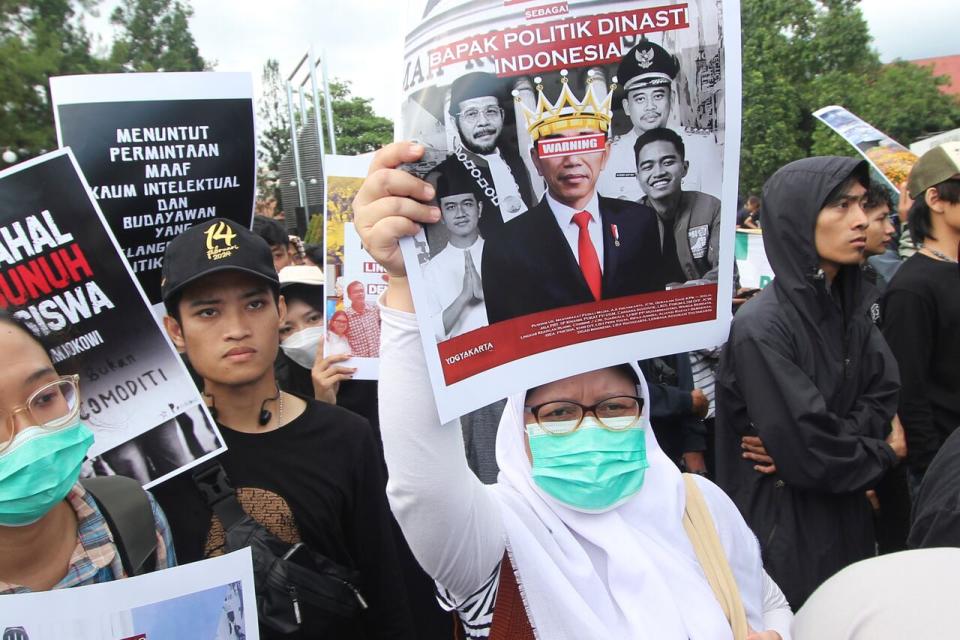
A protester holds up a poster with a defaced image of Indonesian President Joko Widodo during a rally demanding a fair presidential election in Yogyakarta, Indonesia, on Monday. (Slamet Riyadi/The Associated Press)
"Every democracy conducts its elections in different ways," Bland said.
"Conducting the voting in one day brings more clarity to the process and boosts public trust in the results, while enhancing a sense of national unity."
Official results in Indonesia's election could take as long as 35 days to be announced, with a long and arduous counting process ahead.
Unofficial "quick count" results will likely be released on Wednesday, with the data based on sampling from private polling organisations who will speak to voters across the country.
To win, a presidential candidate needs more than 50 per cent of the overall vote. If nobody in this three-way race reaches that figure, then the entire process will have to be repeated in a presidential run-off in June.


